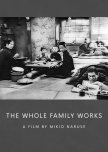"Things can only turn out the way they are going to turn out"
The Whole Family Works was a short working poor slice of life film focused on how difficult and soul crushing it can be to find a way out of poverty. Nine children know that when they finish elementary school their only option is to work at the factory or other menial jobs to bring in money to support the family.
Ishimura’s family of nine lived day to day with the three oldest boys supplementing the family’s income with meager paying jobs. Though Ishimura’s income had been in steady decline, he sipped sake and smoked while his wife lamented not having enough money to purchase tofu. The eldest child, Kiichi, realized at 22-years-old, that his future was slipping rapidly through his fingers. His dead-end factory job would never pay enough to help his parents as they aged or support a wife and family of his own. He was determined to go to school to train as an electrician to improve his chances of gaining better employment. What does filial piety mean and how much does one have to sacrifice for it? Kiichi weighed his responsibility to his parents and to himself. As he said, he had no great ambitions, “I just want enough to eat.” Ishimura was sympathetic to Kiichi’s concerns, also knowing that if he agreed to let Kiichi leave, the others would want the same freedom. As the one who handled the finances his wife was adamant that Kiichi stay. She had already been “borrowing” from one younger son’s savings and struggled every day to feed the large family.
The numerous brothers could make the film hard to follow. They weren’t always identified well at the beginning. Also, the years have not been kind to the film and it was badly faded and blurred, making it often difficult to tell which son was on screen. As a Naruse film, I have no doubt it looked splendid back in 1939, but many scenes were challenging to make out, especially the night scenes.
The family was in a perilous predicament despite the children being raised right. The kids were good students and hard workers and respectful to their parents. Yet they also had dreams of their own and didn’t want to be trapped in hard labor jobs forever. The parents understood the harsh reality that dreams were more easily achieved with money. Something the family didn’t have. Even if Kiichi succeeded in his potential goals, that success was years away, while food and shelter were needed in the present. Director Naruse Mikio didn’t give away the future, only tinged the unknown with gleeful hope and realistic concern.
7 June 2024
Ishimura’s family of nine lived day to day with the three oldest boys supplementing the family’s income with meager paying jobs. Though Ishimura’s income had been in steady decline, he sipped sake and smoked while his wife lamented not having enough money to purchase tofu. The eldest child, Kiichi, realized at 22-years-old, that his future was slipping rapidly through his fingers. His dead-end factory job would never pay enough to help his parents as they aged or support a wife and family of his own. He was determined to go to school to train as an electrician to improve his chances of gaining better employment. What does filial piety mean and how much does one have to sacrifice for it? Kiichi weighed his responsibility to his parents and to himself. As he said, he had no great ambitions, “I just want enough to eat.” Ishimura was sympathetic to Kiichi’s concerns, also knowing that if he agreed to let Kiichi leave, the others would want the same freedom. As the one who handled the finances his wife was adamant that Kiichi stay. She had already been “borrowing” from one younger son’s savings and struggled every day to feed the large family.
The numerous brothers could make the film hard to follow. They weren’t always identified well at the beginning. Also, the years have not been kind to the film and it was badly faded and blurred, making it often difficult to tell which son was on screen. As a Naruse film, I have no doubt it looked splendid back in 1939, but many scenes were challenging to make out, especially the night scenes.
The family was in a perilous predicament despite the children being raised right. The kids were good students and hard workers and respectful to their parents. Yet they also had dreams of their own and didn’t want to be trapped in hard labor jobs forever. The parents understood the harsh reality that dreams were more easily achieved with money. Something the family didn’t have. Even if Kiichi succeeded in his potential goals, that success was years away, while food and shelter were needed in the present. Director Naruse Mikio didn’t give away the future, only tinged the unknown with gleeful hope and realistic concern.
7 June 2024
Considerați utilă această recenzie?

 54
54 191
191 11
11























